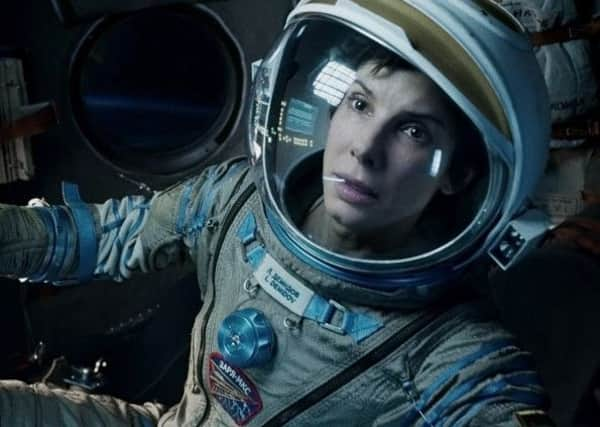2013: A vintage year for cinema


The year’s two best films came from opposite ends of the budget spectrum (Upstream Colour was made for roughly a 1,000th of the price of Gravity), but Alfonso Cuarón’s space survival thriller and Shane Carruth’s identity theft mind-melter both showcased cinema’s capacity for inspiring wonder while simultaneously advancing the form in radical new ways.
In Gravity that breakthrough was technological, with Cuarón using next-level digital trickery to create a piece of pure cinematic spectacle that brilliantly enhanced a simple story about the fragility and resilience of human life. In Upstream Colour the advances were more narrative: Caruth created an abstract puzzle that required viewers to forget almost everything they knew about traditional filmmaking in order to tap into the big question at the heart of the film: what makes us who we are? Both films, however, suggested the future of cinema was in good hands.
‘Divisive’
Advertisement
Hide AdThere was plenty of other great, challenging cinema out there too, though, and much of it proved entertainingly divisive. Quentin Tarantino’s masterful Django Unchained, for instance, hit British cinemas and saw the superstar director pilloried for daring to filter the issue of slavery through the gaudy prism of blaxploitation movies and spaghetti westerns. What detractors failed to acknowledge was that in doing so he was operating on a more subversively intellectual level: not only did Django Unchained force audiences to confront the ugliness of the subject in a visceral way, it acknowledged the cinematic importance of the types of fringe movies that have historically confronted racial, political and sexual issues long before the mainstream worked up the courage to even acknowledge their existence.
Harmony Korine’s Spring Breakers and Nicholas Winding Refn’s Only God Forgives also seemed to rile knee-jerk commentators. Korine’s impressionistic day-glow crime film – which revolved around a group of balaclava-clad, bikini-wearing college students on a hedonistic rampage – served up a brilliantly warped vision of a horribly warped culture and snuck in interesting meditations on race, capitalism and the loss of innocence, all sound-tracked to some inspired a cappella cover versions of Britney Spears songs. The result was like a hand-grenade being lobbed at the mainstream. Winding Refn, meanwhile, really sorted the sheep from the goats with Only God Forgives. His follow-up to Drive was an eye-wateringly violent anti-revenge movie, one that seemed deliberately designed to upset Ryan Gosling fans by casting him as a sad, pathetic mummy’s boy with a monstrous Oedipal complex.
‘Shockingly surreal’
All these films riffed in surreal ways on genre expectations and the power of cinema to shock, but no film was quite as shockingly surreal as The Act of Killing, Joshua Oppenheimer’s jaw-dropping documentary about a group of ageing Indonesian gangsters reflecting on their days as members of a government-sanctioned kill squad. Featuring the bizarre sight of sadistic killers cheerfully recreating for the cameras their preferred methods of murder, the film served up the year’s most extraordinary image: a hitherto unrepentant sadist unraveling emotionally after his “performance” unlocks decades of denial. It was a remarkable testament to the power of cinema and its ability to elicit hard truths.
The same might be said of Paul Greengrass’s Somali pirate drama Captain Phillips and Katherine Bigelow’s dramatisation of the ten-year hunt for Osama bin Laden, Zero Dark Thirty. Both functioned as ripped-from-the-headlines thrillers that went far beyond their respective stories’ high-stakes flash-point moments. Both also pointedly eschewed flag-waving jingoism, with the Navy Seal strikes that brought each film to a startling head giving way to a remarkable moment of emotional decompression in Captain Phillips and raising an ambiguous moral question in Zero Dark Thirty.
Women lead way in comedy
There were some laughs to be had in 2013. Shane Black made Iron Man 3, the smartest and funniest Marvel superhero movie to date while Alan Partridge: Alpha Papa brought Steve Coogan’s finest creation successfully to the big screen. Women, however, made the year’s best comedies. Writer/director/star Lake Bell’s hilarious In A World… challenged old-school sexism in the movie industry in a fresh and funny way. Writer/director Leslye Headland served up a dark, spiky exploration of female friendship in Bachelorette. Enough Said writer/director Nicole Holofcener finally broke through into the mainstream with the wonderful Enough Said. And – though not strictly a comedy – the Greta Gerwig-scripted Frances Ha was the year’s most joyous and infectious film.
Scottish cinema
There was also much chat about a Scottish film revival. True, much of this seemed to hinge on a quirk of distribution fate that resulted in Filth, Sunshine on Leith and For Those in Peril opening within a couple of weeks of one other. Nevertheless, each of those titles did have their merits. For Those in Peril’s writer/director Paul Wright certainly demonstrated he was a filmmaker with vision and, while I didn’t much care for Filth, James McAvoy was fantastic as its off-his-head protagonist. As for The Proclaimers musical, well, that was as corny as expected, but nowhere near as cringe-worthy as it could have been.
Advertisement
Hide AdIn a way, though, it’s too bad that Under the Skin, Jonathan Glazer’s endearingly weird adaptation of Michel Faber’s novel of the same name, didn’t also hit cinemas this year. Debuting on the festival circuit instead, the film – which stars Scarlett Johansson as a shape-shifting alien succubus prowling the streets of Glasgow for men – was as daring as anything I saw this year. At least its imminent arrival next March means 2014 already has one great film on the books.